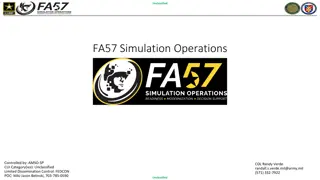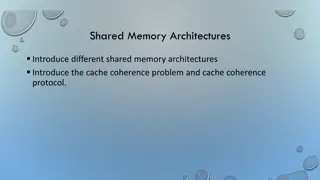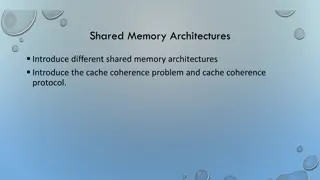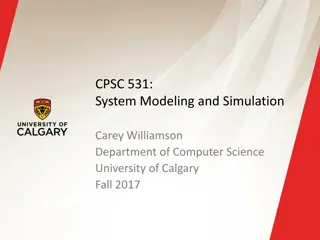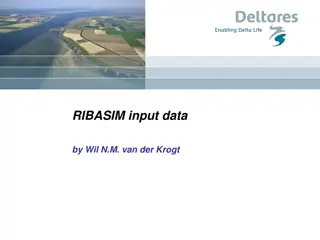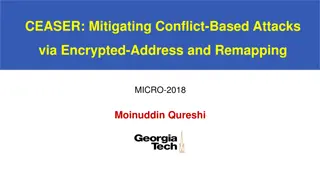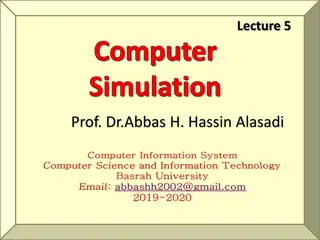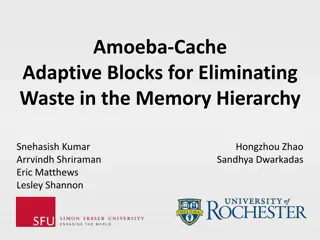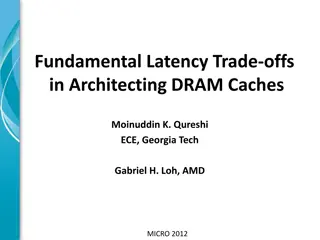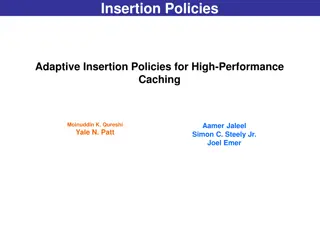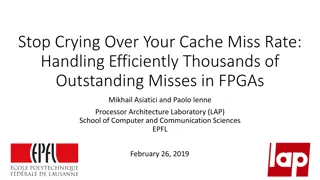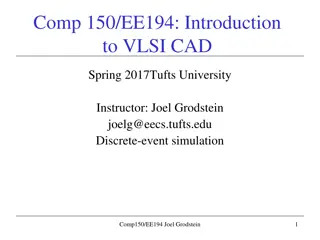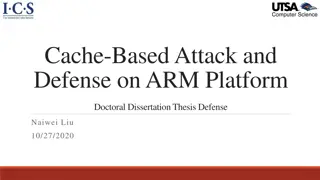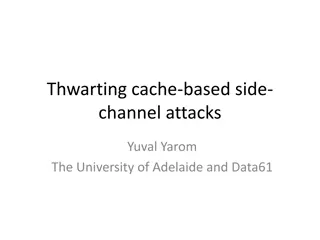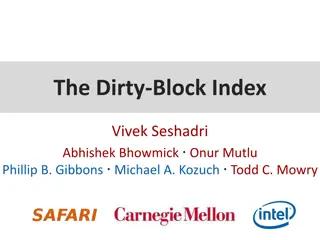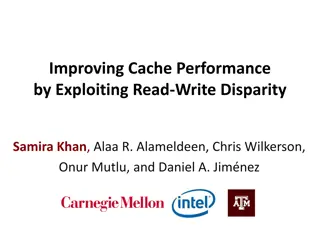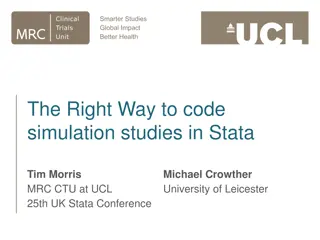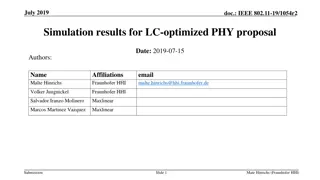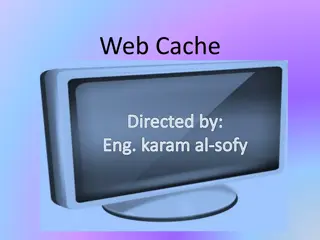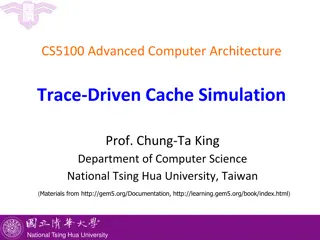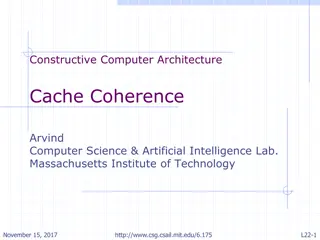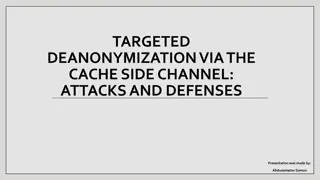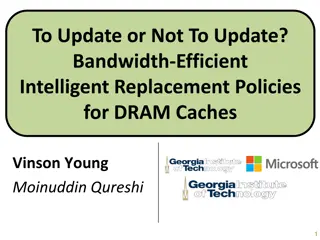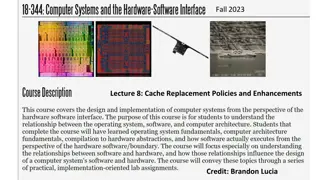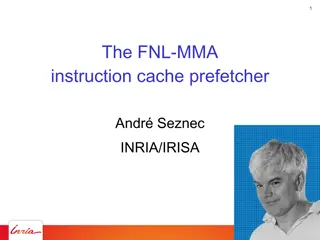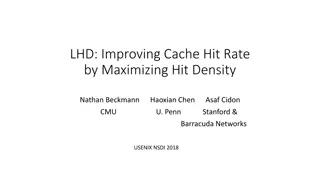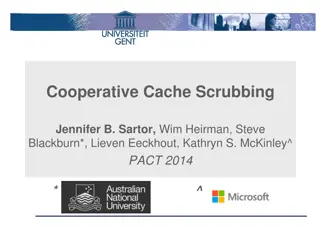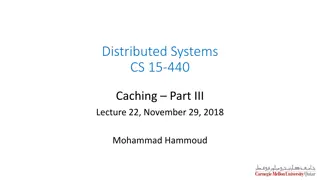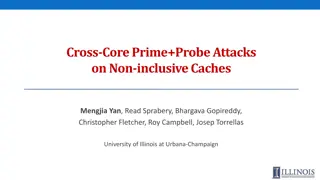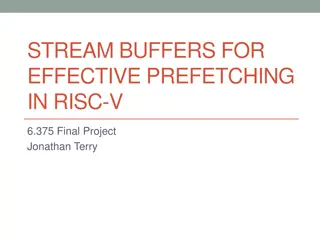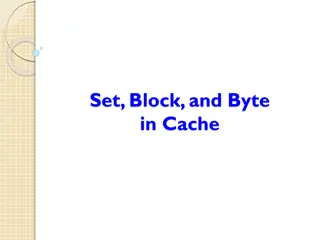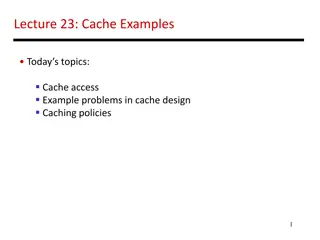Overview of Army Modeling and Simulation Office
The U.S. Army Modeling and Simulation Office (AMSO) serves as the lead activity in developing strategy and policy for the Army Modeling and Simulation Enterprise. It focuses on effective governance, resource management, coordination across various community areas, and training the Army Analysis, Mod
2 views • 8 slides
Cache and Virtual Memory in Computer Systems
A computer's memory system is crucial for ensuring fast and uninterrupted access to data by the processor. This system comprises internal processor memories, primary memory, and secondary memory such as hard drives. The utilization of cache memory helps bridge the speed gap between the CPU and main
2 views • 47 slides
Shared Memory Architectures and Cache Coherence
Shared memory architectures involve multiple CPUs sharing one memory with a global address space, with challenges like the cache coherence problem. This summary delves into UMA and NUMA architectures, addressing issues like memory latency and bandwidth, as well as the bus-based UMA and NUMA shared m
1 views • 27 slides
Cache Memory in Computer Architecture
Cache memory is a crucial component in computer architecture that aims to accelerate memory accesses by storing frequently used data closer to the CPU. This faster access is achieved through SRAM-based cache, which offers much shorter cycle times compared to DRAM. Various cache mapping schemes are e
2 views • 20 slides
GPU Scheduling Strategies: Maximizing Performance with Cache-Conscious Wavefront Scheduling
Explore GPU scheduling strategies including Loose Round Robin (LRR) for maximizing performance by efficiently managing warps, Cache-Conscious Wavefront Scheduling for improved cache utilization, and Greedy-then-oldest (GTO) scheduling to enhance cache locality. Learn how these techniques optimize GP
1 views • 21 slides
Shared Memory Architectures and Cache Coherence
Shared memory architectures involve multiple CPUs accessing a common memory, leading to challenges like the cache coherence problem. This article delves into different types of shared memory architectures, such as UMA and NUMA, and explores the cache coherence issue and protocols. It also highlights
2 views • 27 slides
System Modeling and Simulation Overview
This content provides insights into CPSC 531: System Modeling and Simulation course, covering topics such as performance evaluation, simulation modeling, and terminology in system modeling. It emphasizes the importance of developing simulation programs, advantages of simulation, and key concepts lik
1 views • 28 slides
Basin Manipulation Simulation Analysis Tool Overview
Basin Manipulation Simulation Analysis Tool provides a comprehensive solution for managing and analyzing basin data, including tasks like basin manipulation, simulation analysis, case management, and defining simulation time steps. The tool allows for easy data entry, visualization of simulation res
4 views • 17 slides
Mitigating Conflict-Based Attacks in Modern Systems
CEASER presents a solution to protect Last-Level Cache (LLC) from conflict-based cache attacks using encrypted address space and remapping techniques. By avoiding traditional table-based randomization and instead employing encryption for cache mapping, CEASER aims to provide enhanced security with n
1 views • 21 slides
Computer Simulation and Modeling Tools
Computer simulation and modeling is essential for conducting studies in various fields. Selecting the right simulation language or package is crucial for accurate results. This involves considering the characteristics of the language, such as random number generation, process transformers, list proc
2 views • 7 slides
Amoeba Cache: Adaptive Blocks for Memory Hierarchy Optimization
The Amoeba Cache introduces adaptive blocks to optimize memory hierarchy utilization, eliminating waste by dynamically adjusting storage allocations. Factors influencing cache efficiency and application-specific behaviors are explored. Images and data distributions illustrate the effectiveness of th
0 views • 57 slides
Cache Memory Designs: Set vs Fully Associative Cache
Exploring the concepts of cache memory designs through Aaron Tan's NUS Lecture #23. Covering topics such as types of cache misses, block size trade-off, set associative cache, fully associative cache, block replacement policy, and more. Dive into the nuances of cache memory optimization and understa
0 views • 42 slides
Architecting DRAM Caches for Low Latency and High Bandwidth
Addressing fundamental latency trade-offs in designing DRAM caches involves considerations such as memory stacking for improved latency and bandwidth, organizing large caches at cache-line granularity to minimize wasted space, and optimizing cache designs to reduce access latency. Challenges include
0 views • 32 slides
Cache Memory Organization in Computer Systems
Exploring concepts such as set-associative cache, direct-mapped cache, fully-associative cache, and replacement policies in cache memory design. Delve into topics like generality of set-associative caches, block mapping in different cache architectures, hit rates, conflicts, and eviction strategies.
0 views • 35 slides
Adaptive Insertion Policies for High-Performance Caching
Explore the concept of adaptive insertion policies in high-performance caching systems, focusing on mitigating the issue of Dead on Arrival (DoA) lines by making simple changes to cache insertion policies. Understanding cache replacement components, victim selection, and insertion policy can signifi
0 views • 15 slides
Efficient Handling of Cache Miss Rate in FPGAs
This study focuses on improving cache miss rate efficiency in FPGAs through the implementation of non-blocking caches and efficient Miss Status Holding Registers (MSHRs). By tracking more outstanding misses and utilizing memory-level parallelism, this approach proves to be more cost-effective than s
0 views • 44 slides
Introduction to VLSI CAD and Discrete-Event Simulation at Tufts University
This course introduces students to event-oriented simulation, building virtual models, and validating designs through simulation. It covers the importance of simulation in testing and refining designs before implementation. Examples include simulating VLSI networks and exploring the use of discrete-
0 views • 32 slides
Cache-Based Attack and Defense on ARM Platform - Doctoral Dissertation Thesis Defense
Recent research efforts have focused on securing ARM platforms due to their prevalence in the market. The study delves into cache-based security threats and defenses on ARM architecture, emphasizing the risks posed by side-channel attacks on the Last-Level Cache. It discusses the effectiveness of si
0 views • 44 slides
Defending Against Cache-Based Side-Channel Attacks
The content discusses strategies to mitigate cache-based side-channel attacks, focusing on the importance of constant-time programming to avoid timing vulnerabilities. It covers topics such as microarchitectural attacks, cache structure, Prime+Probe attack, and the Bernstein attack on AES. Through d
0 views • 25 slides
Efficient Cache Management using The Dirty-Block Index
The Dirty-Block Index (DBI) is a solution to address inefficiencies in caches by removing dirty bits from cache tag stores, improving query response efficiency, and enabling various optimizations like DRAM-aware writeback. Its implementation leads to significant performance gains and cache area redu
0 views • 44 slides
Improving Cache Performance Through Read-Write Disparity
This study explores how exploiting the difference between read and write requests can enhance cache performance by prioritizing read over write operations. By dynamically partitioning the cache and protecting lines with more read hits, the proposed method demonstrates significant performance improve
0 views • 27 slides
Cache Memory in Computer Systems
Explore the intricate world of cache memory in computer systems through detailed explanations of how it functions, its types, and its role in enhancing system performance. Delve into the nuances of associative memory, valid and dirty bits, as well as fully associative examples to grasp the complexit
1 views • 15 slides
Cache Coherency and Multi-Core Programming
Explore the intricate world of cache coherency and multi-core programming through images and descriptions covering topics such as how cache shares data between cores, maintaining data consistency, CPU architecture, memory caching, MESI protocol, and interconnect bus communication.
0 views • 97 slides
The Right Way to Code Simulation Studies in Stata
Simulation studies in Stata involve using (pseudo) random numbers to generate data from a distribution for studying statistical methods. This process helps to evaluate different scenarios and understand the properties of statistical techniques. Key components like ADEMP (Aims, Data-generating mechan
3 views • 18 slides
Simulation Results for LC-Optimized PHY Proposal in July 2019
The document presents simulation results for an LC-optimized PHY proposal for TGbb based on G.9991 PHY. It includes details on the simulation setup, frame detection results, header modulation, coding simulation results, payload modulation, and coding simulation results. The setup involved various re
0 views • 18 slides
Web Caching: An Overview
Web caching, implemented through various types of caches like browser cache, proxy cache, and gateway cache, plays a crucial role in improving content availability, reducing network congestion, and enhancing user experience by saving bandwidth and decreasing latency. It addresses the challenges pose
0 views • 27 slides
Trace-Driven Cache Simulation in Advanced Computer Architecture
Trace-driven simulation is a key method for assessing memory hierarchy performance, particularly focusing on hits and misses. Dinero IV is a cache simulator used for memory reference traces without timing simulation capabilities. The tool aids in evaluating cache hit and miss results but does not ha
0 views • 13 slides
Cache Coherence in Computer Architecture
Exploring the concept of cache coherence in computer architecture, this content delves into the challenges and solutions associated with maintaining consistency among multiple caches in modern systems. It discusses the importance of coherence in shared memory systems and the use of cache-coherent me
0 views • 24 slides
Targeted Deanonymization via the Cache Side Channel: Attacks and Defenses
This presentation by Abdusamatov Somon explores targeted deanonymization through cache side-channel attacks, focusing on leaky resource attacks and cache-based side-channel attacks. It discusses the motivation behind these attacks, methods employed, potential defenses, and the evaluation of such att
0 views • 16 slides
Clearing Browser Cache and Cookies: Google Chrome Edition
In this guide, you will learn how to clear the browser cache and cookies in Google Chrome. Follow the easy steps to ensure smooth browsing experience. From accessing your browser settings to selecting the right options, this tutorial covers it all. Keep your browser running efficiently by regularly
0 views • 6 slides
Intelligent DRAM Cache Strategies for Bandwidth Optimization
Efficiently managing DRAM caches is crucial due to increasing memory demands and bandwidth limitations. Strategies like using DRAM as a cache, architectural considerations for large DRAM caches, and understanding replacement policies are explored in this study to enhance memory bandwidth and capacit
0 views • 23 slides
Cache Replacement Policies and Enhancements in Fall 2023 Lecture 8 by Brandon Lucia
The Fall 2023 Lecture 8 by Brandon Lucia delves into cache replacement policies and enhancements for efficient memory management. The session covers the intricacies of replacement policies such as Round Robin, discussing evictions and block prioritization within cache sets. Visual aids and examples
0 views • 60 slides
Efficient Instruction Cache Prefetching Techniques
Discussion on issues and solutions related to instruction cache prefetching, including trigger timing, next-line prefetching, I-Shadow cache, and footprint prediction. Evaluation results show improved performance with FNL methodology compared to traditional prefetching methods.
0 views • 24 slides
Maximizing Cache Hit Rate with LHD: An Overview
This presentation discusses the concept of Least Hit Density (LHD) for improving cache hit rates, focusing on the challenges and benefits of key-value caches in maximizing performance through efficient eviction policies like LRU. It emphasizes the importance of cache hit rates in enhancing web appli
0 views • 40 slides
Cooperative Cache Scrubbing for Efficient Memory Management in Multicore Systems
Cooperative Cache Scrubbing optimizes memory management in multicore systems by efficiently handling short-lived application objects and reducing unnecessary data writes to memory. By communicating semantic information to hardware caches, dead lines are scrubbed, dirty bits unset, and unnecessary fe
0 views • 40 slides
Cache Replacement Policies in Distributed Systems: Key Considerations and Challenges
Explore the critical aspects of cache replacement policies in distributed systems, including cache consistency, update propagation, eviction strategies, and working sets. Dive into the implications of different policies like LRU and discover why certain access patterns may not be efficiently handled
0 views • 22 slides
Cross-Core Prime+Probe Attacks on Non-inclusive Caches: Modern Challenges and Solutions
Modern systems are transitioning to non-inclusive cache hierarchies, presenting new challenges for cache attacks. This study delves into the complexities of Prime+Probe attacks on non-inclusive caches, highlighting the difficulties in eviction set construction and the need for innovative strategies
0 views • 10 slides
EFFECTIVE PREFETCHING
Think of a Stream Buffer as an aid to cache, prefetching data words preemptively to reduce L1 cache miss penalty. Upon a cache miss, the Stream Buffer is checked for needed data, enhancing system performance. Explore the architecture, system modifications, request scheduler, and implementation resul
0 views • 17 slides
Set, Block, and Byte in Cache
Learn about set, block, and byte in the cache to optimize memory utilization. Explore how data is placed within cache blocks using block addresses and indices. Understand the principles of spatial locality and associative cache mapping for efficient data retrieval.
0 views • 14 slides
Cache Examples and Access Patterns
Today's lecture covers cache access, problems in cache design, and caching policies. Examples include direct-mapped cache, tag arrays, access patterns, line size impact, and associativity. Explore how cache hits and misses are affected based on address requests. Learn about set-associative cache des
0 views • 18 slides
